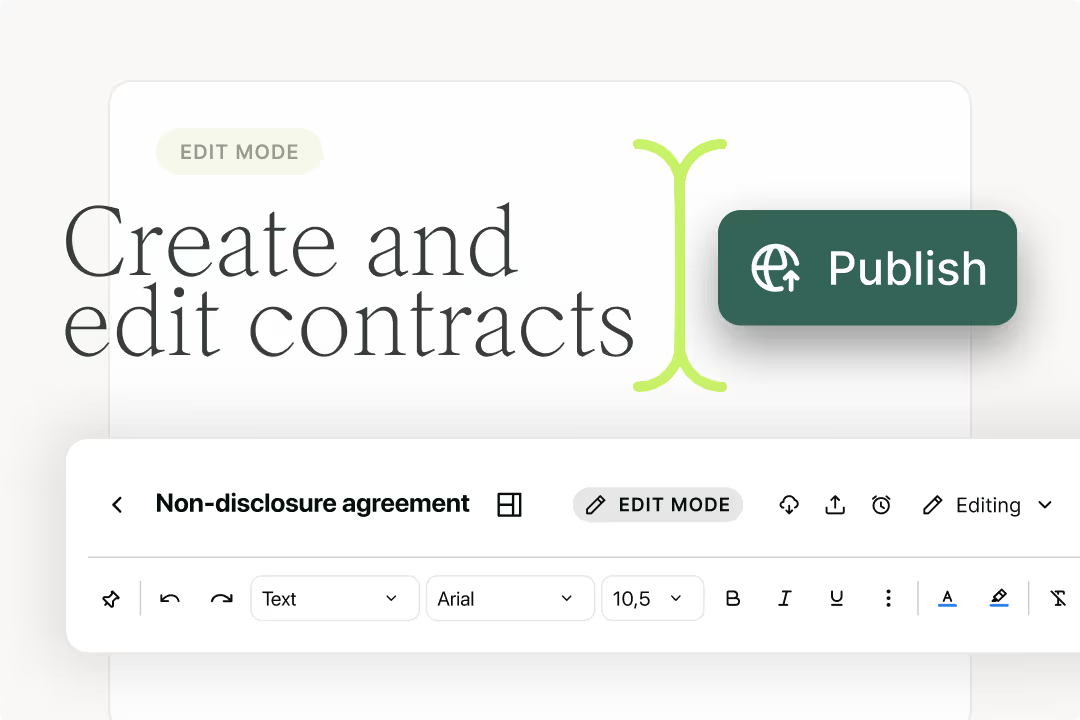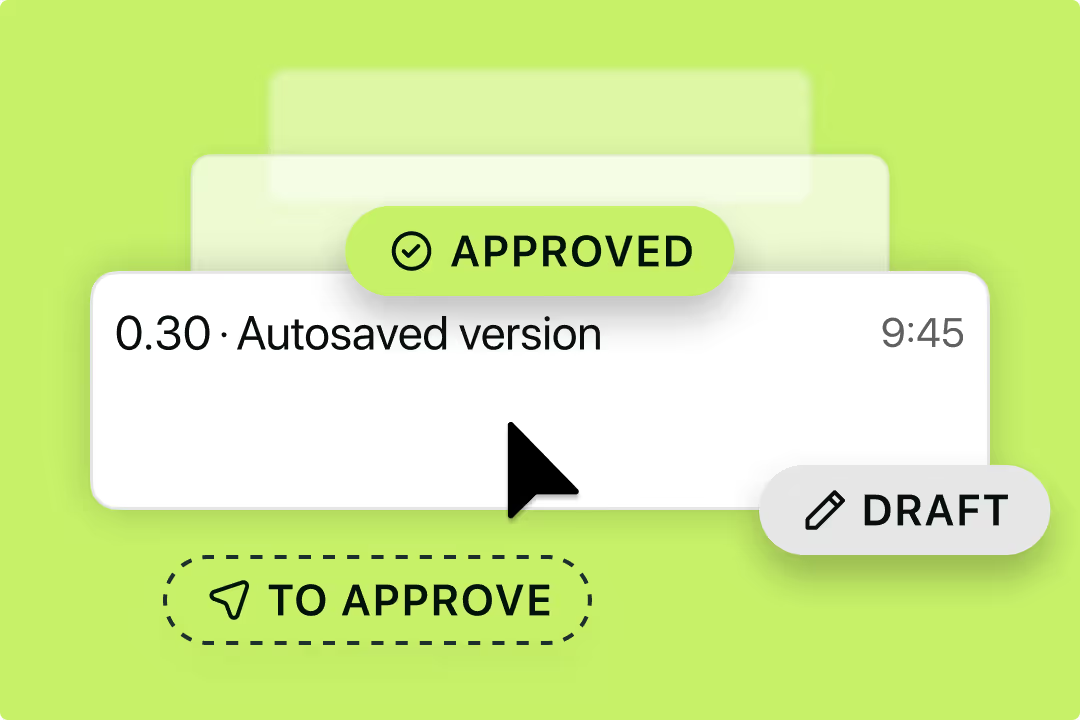Solutions
Customer Support
Resources
Contract value leakage is one of the quietest — and most expensive — risks in modern contracting.
From weak terms and missed renewals to poor visibility after signature, value often erodes long after a deal is signed. Understanding where that value is lost — and how to stop it — is essential for protecting revenue and scaling efficiently in 2026 and beyond.
Contract value leakage describes a loss or reduction in the expected value of a contract. It occurs when the benefits or potential returns of a contract have diminished compared to what was originally anticipated or intended by the parties.
Another way to understand contract value leakage is to recognize how a contract loses value throughout its lifetime, comparing what a contract is worth at the point of inception, signature, and performance.
All businesses should be worried about contract value leakage, with research by WCC finding that it costs companies 9 per cent of their revenue on average.

Organizations can experience contract value leakage for a number of reasons. However, there are a few common causes that your business should be aware of.
Agreeing to contracts with unfavorable terms is one of the biggest causes of contract value leakage, with many companies settling on terms without negotiating and optimizing them.
Mistakes in the contract, such as missing clauses or incorrect terms, can also result in contract value leakage. This is because contracts with errors and omissions fail to protect parties from liabilities, making them more susceptible to financial losses.
This is more common in businesses without robust contract templates in place as individuals draft their own terms, rather than using terms pre-approved by legal teams.
Inefficient contract management processes can also diminish the expected value of a contract. This is because inefficiencies during the contract process can lead to increased operational costs and a lack of visibility into contracts throughout the lifecycle, which invites contractual risk.
For example, inefficient contract management processes can lead to drawn-out sales cycles, missed discounts, and a higher headcount. All of these things can make contracting more expensive, eroding the value of contracts as a result.
If the scope of work defined in the contract expands beyond its original boundaries, it can lead to increased costs and reduced value. This can occur due to changes in project requirements, additional deliverables, or unanticipated challenges.
Scope creep is a common cause of contract value leakage in construction contract management where the scope of work and associated costs can be challenging to accurately predict, resulting in unexpected costs.
Contract value leakage can also occur when a supplier or vendor fails to meet the standards established for a product or service.
For example, if a company contracts with a supplier for specific high-quality materials, but the supplier delivers substandard, lower-value materials, this can have a knock-on effect for the buyer. It could mean that they have to sell them for less, or some of the materials won’t be used.
External factors can also result in contract value leakage. For example, changes in market conditions or currency exchange rates can both impact the value of a contract. They can lead to unfavorable pricing, cost fluctuations, and reduced profits.
Although these fluctuations are difficult to predict and safeguard against, there are things you can do to futureproof your contracts. We’ll discuss these later in this article.
Poor contract visibility is another leading cause of contract value leakage. In particular, businesses often fall into the trap of missing upcoming contract renewal deadlines, or failing to perform their contractual obligations altogether.
This means that they can either find themselves trapped in contracts that have auto-renewed, or face the financial implications of a contract breach.

The best way to measure contract value leakage is to subtract the actual contract value from the expected value of the contract.
Expected contract value - actual contract value = contract value leakage
The actual contract value is best measured post-execution, once the contract has been performed in full. The expected value of the contract is what you anticipate to gain from it when you first initiate the contract.
The difference between the two figures will give you the sum of contract value leakage.
Fortunately, there are actionable steps you can take to minimize contract value leakage for your business, and most causes can be resolved using contract management software. Let's run through some tips to help you reduce contract value leakage in 2026.
The first thing you can do to minimize contract value leakage is control the terms contracts are agreed on.
Rather than allowing your commercial teams to draft their own contract terms and edit templates freely, automated contract templates make sure teams only agree contracts on terms pre-approved and defined by legal teams.
This ensures that contracts are standardized throughout the organization to minimize risk and increase compliance.

Businesses can also reduce contract value leakage by ensuring that contracts are reviewed and approved properly they are sent out for signing. This gives stakeholders a chance to flag any high-risk terms and replace them with more favourable ones. This is particularly important for more complex contracts, or contracts with a high contract value.
Automated approval workflows are a great way to make sure contracts are reviewed by the right people at the right time, and AI contract review software can make the process of conducting these reviews much faster and more efficient.

Juro's legal AI makes it easy for teams to review contracts against their contract playbooks and flag key legal risks. To find out more, hit the button below to speak to one of our contract specialists.

You should also be proactive about minimizing the risk of contract value leakage during contract negotiations. For example, you could negotiate the use of limitation of liability clauses to protect your business, or agree more favourable payment terms.
For more tips and advice on negotiating contracts effectively, check out the resources below:
Another tip for reducing contract value leakage is to improve visibility into your contracts. That way, you'll be able to avoid costly auto-renewals and track contractual obligations at scale.
The best way to do this is to find a contract repository that builds your contracts as structured data, making them fully searchable.
Juro's data-rich contract repository enables businesses to find, query and track contracts at scale, with secure storage and handy contract dashboards that make extracting key contract data simple.
This improved visibility into your contracts will enable you to identify risks and act quickly to defend against contract value leakage.

As we mentioned earlier, operational inefficiencies are a common cause of contract value leakage. Not only do they consume more resource, but they also result in costly mistakes.
Fortunately, there are plenty of opportunities for legal automation when it comes to managing contracts.
For example, Juro users can automate the contract creation process using automated contract templates and integrations with other business tools, like Salesforce and HubSpot. Once set up, these workflows will enable sales reps to generate watertight contracts in just a few clicks.
There are also other opportunities to automate contract admin, like using bulk actions to mass sign contracts. With an intelligent contact automation platform like Juro, the possibilities are endless.
{{quote1}}
Juro’s AI-enabled contract automation platform empowers legal and other business teams to accelerate the creation, execution and management of contracts.
To find out what's possible for your business, fill in the form below to book a personalized demo.
Lorem ipsum dolor sit amet, consectetur adipiscing elit. Suspendisse varius enim in eros elementum tristique. Duis cursus, mi quis viverra ornare, eros dolor interdum nulla, ut commodo diam libero vitae erat. Aenean faucibus nibh et justo cursus id rutrum lorem imperdiet. Nunc ut sem vitae risus tristique posuere.

